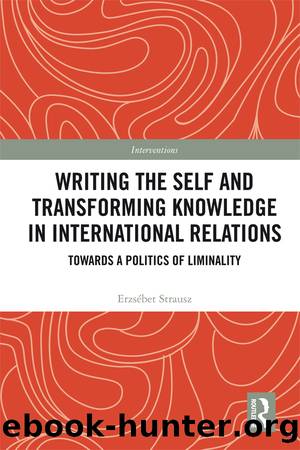Writing the Self and Transforming Knowledge in International Relations: Towards a Politics of Liminality by Erzsebet Strausz

Author:Erzsebet Strausz [Strausz, Erzsebet]
Language: eng
Format: epub
Tags: Political Science, General
ISBN: 9781351402644
Google: MxdSDwAAQBAJ
Goodreads: 39652813
Publisher: Routledge
Published: 2018-03-19T00:00:00+00:00
Foucaultâs imaginary dialogue illuminates a mode of inquiry particular to his generation. Deleuze describes the main aim of critique as catching âthings where they were at work, in the middle,â and capturing the emergence of âactualityâ by âbreaking things open, breaking words open.â14 Foucault breaks âdiscourseâ open and lays bare its operations. He turns the âfoldâ around, the internalized âworldâ within that mirrors the social by externalizing and enlarging that register of subjectivity where âinsideâ and âoutsideâ meet.15 He names the forces on the sides of both discourse and subjectivity that make up and mark out the malleable boundaries of the subject. He separates out and re-animates those pulls that may otherwise be indistinguishable as the background noise of everyday life. âDesireâ and âthe institutionâ donât always have a name, they just talk, often in multiple voices and past each other, fading in, fading out, with no end. Circumstances and their life world, what is given, what is done to us and what we may do to ourselves often blend, the edges of what is what are blurred. Foucaultâs staged dialogue exaggerates and fictionalizes what might taking place in the processes of subject formation. With that it enacts a moment of rupture in discourse when this dynamic can be encountered as a structure of the unthought, operative and effective on us, in us. Being exposed to this scene we might catch ourselves being subject to similar thought processes wrestling similarly conflicting pressures. Desire, frustration, struggle or maybe the hope to be otherwise might resonate with what we have experienced ourselves. Foucaultâs intervention makes an instance of the unthought thinkable and sensible. It creates a new experience by turning up the ever-present background noise of institutional routine and habitual social interactions so that it can be listened to as sound in its own right, on its own terms. He wrote that âwe have to move beyond the outside-inside alternative; we have to be at the frontiers,â right at the limits.16 Maybe the frontier, the limit, the threshold is that space of recognition where we can witness âactualityâ as it emerges, where what we do and how we are in what we do might divert from its old sense the first time. Maybe at the limits the limit is no longer that limiting either. There seems to be absolutely nothing on the other side. Maybe this really is freedom.
By now I can see that an âontology of ourselvesâ, of âwho we areâ in the present calls for a form of reflection that goes beyond the mere acknowledgement that we are, too, part of the phenomena that we analyze, theorize or critique. Foucaultâs pragmatic, practical mode of being opens up to negotiation how it is that we are both âelementsâ and âactorsâ in whatever we do, academic and other.17 Through tracing Foucaultâs intellectual project as a unique form of experiencing âscienceâ and a constant remaking of this experience I came to understand that this âhowâ for my project can only derive from my own ways of inhabiting âdisciplinary lifeâ while trying to make sense of the world.
Download
This site does not store any files on its server. We only index and link to content provided by other sites. Please contact the content providers to delete copyright contents if any and email us, we'll remove relevant links or contents immediately.
Collaborating with Parents for Early School Success : The Achieving-Behaving-Caring Program by Stephanie H. McConaughy; Pam Kay; Julie A. Welkowitz; Kim Hewitt; Martha D. Fitzgerald(897)
Entrepreneurship Education and Training: The Issue of Effectiveness by Colette Henry Frances Hill Claire Leitch(665)
Adding Value to Policy Analysis and Advice by Claudia Scott; Karen Baehler(499)
Materializing the Middle Passage by Jane Webster;(496)
Race and American Political Development by unknow(488)
Sociological Perspectives of Health and Illness by Constantinos N. Phellas(478)
American Government and Politics Today by Steffen W. Schmidt Mack C. Shelley Barbara A. Bardes(475)
Human and Global Security : An Exploration of Terms by Peter Stoett(460)
Control Of Oil - Hardback by Kayal(457)
The Disappearance of Rituals: A Topology of the Present by Byung-Chul Han(398)
Advances in Child Development and Behavior, Volume 37 by Patricia J. Bauer(396)
The Catholic Church and European State Formation, AD 1000-1500 by Jørgen Møller(388)
The World According to China by Elizabeth C. Economy(379)
Theories of Counseling and Psychotherapy: A Case Approach by Nancy L. Murdock(370)
Left Is Not Woke by Susan Neiman(366)
Application of classical statistics, logratio transformation and multifractal approaches to delineate geochemical anomalies in the Zarshuran gold district, NW Iran by unknow(362)
Turkey's Relations with the West and the Turkic Republics: The Rise and Fall of the Turkish Model by Idris Bal(352)
Cross-Cultural Child Development for Social Workers by Lena Robinson(348)
Japan's Ainu Minority in Tokyo by Mark K. Watson(331)
